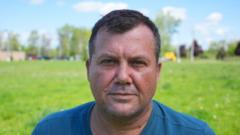Charl Kleinhaus, a 46-year-old farmer, recently transitioned from his family farm in Mpumalanga province, South Africa, to a modest hotel in Buffalo, New York. This significant change comes after he sought refuge in the US under a policy instituted by former President Donald Trump, aimed at protecting white South Africans whom he claims face persecution. South Africa, however, strongly refutes such allegations.
Reflecting on his departure, Mr. Kleinhaus detailed the grave threats he received via WhatsApp, stating, "I had to leave a five-bedroom house, which I will lose now." He reminisces about leaving behind not only his physical possessions but also his family, including his mother and pets. He emphasizes that his relocation was not voluntary leisure: "I didn't come here for fun." However, despite the stark living conditions, he believes he and his children are now safe.
The plight of white South African farmers has long served as a rallying point for right-wing factions in the U.S. Figures like Trump and billionaire Elon Musk have controversially suggested that white farmers in South Africa are victims of "genocide," a claim dismissed by many scholars and institutions.
Under Trump's administration, an executive order was signed in February that granted refugee status to Afrikaners like Kleinhaus who argue they are facing persecution. He expressed gratitude to Trump, indicating, "Finally, somebody in this world is seeing what's going on," following an enthusiastic, red, white, and blue welcome upon arriving at Dulles Airport.
Historically, Afrikaners, a white ethnic minority, governed South Africa during the apartheid period, enforcing systemic racial segregation until its abolition in 1994. However, today, discussions about land ownership have highlighted enduring racial tensions. Mr. Kleinhaus acknowledges the historical suffering of black South Africans while expressing fears over potential land seizure under new South African legislation that permits state-expropriation of land without compensation.
While Mr. Kleinhaus's claims of persecution have faced skepticism from fellow Afrikaners, who label him an opportunist, he countered that valid infrastructure issues do exist. He cited explicit threats received from local community members and noted police inaction with regard to tangible threats.
In response to growing concerns about the implications of his migration, South African President Cyril Ramaphosa labeled those receiving U.S. refugee status as "cowards," asserting that they are avoiding the tough realities faced in their homeland. He urged resolution over flight from domestic troubles.
Kleinhaus's migration is also controversial, particularly given that other refugees, such as Afghans, have had their status revoked, a disparity underscored by critics who view selective acceptance as politically motivated. Kleinhaus, while expressing sympathy for other refugees, feels justified in his own path, characterized by survival and protection for his family.
A contentious aspect of Mr. Kleinhaus’s story involves scrutiny of his past social media behavior, raising questions about vetting processes for resettlement. He faces allegations regarding antisemitic remarks made previously, which he sought to contextualize as isolated incidents of anger. Questions remain as to how the U.S. oversees such vetting, as clarifications from the Department of Homeland Security emphasize thorough scrutiny of all refugee applicants.
Looking ahead, Mr. Kleinhaus conveyed concerns about potential political exploitation but remained optimistic about contributing to American society. "People must not think we are just taking advantage of this,” he stated, believing his presence in the U.S. was part of a divine plan, asserting, “My life is in his hands.”




















